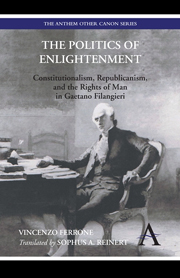 The Politics of Enlightenment
The Politics of Enlightenment Book contents
- Frontmatter
- Contents
- Foreword
- Preface
- Part One The New Politics ‘Ex Parte Civium’
- Part Two A Difficult Legacy
- Chapter Eight The Original Character of Enlightenment Constitutionalism: From the Scienza della legislazione to the 1799 Progetto di costituzione napoletana
- Chapter Nine Vincenzo Cuoco: The National Critique of Cosmopolitan Enlightenment Constitutionalism
- Chapter Ten The Liberal Constant against the Enlightened Filangieri: Two interpretations of Modernity
- Chapter Eleven Filangierian Heresies in the European Democratic Tradition: The Principle of Justice and the Right to Happiness
- Notes
- Index
Chapter Eleven - Filangierian Heresies in the European Democratic Tradition: The Principle of Justice and the Right to Happiness
from Part Two - A Difficult Legacy
Published online by Cambridge University Press: 05 February 2013
- Frontmatter
- Contents
- Foreword
- Preface
- Part One The New Politics ‘Ex Parte Civium’
- Part Two A Difficult Legacy
- Chapter Eight The Original Character of Enlightenment Constitutionalism: From the Scienza della legislazione to the 1799 Progetto di costituzione napoletana
- Chapter Nine Vincenzo Cuoco: The National Critique of Cosmopolitan Enlightenment Constitutionalism
- Chapter Ten The Liberal Constant against the Enlightened Filangieri: Two interpretations of Modernity
- Chapter Eleven Filangierian Heresies in the European Democratic Tradition: The Principle of Justice and the Right to Happiness
- Notes
- Index
Summary
We hold these truths to be self-evident, that all men are created equal, that they are endowed by their Creator with certain unalienable Rights, that among these are Life, Liberty and the pursuit of Happiness.
The Declaration of Independence of the United States of America (1776)Art. 1. The scope of society is the common happiness.
Constitution of the French Republic (1793)18. Every man must help others and push himself to preserve and better the existence of his similars… 19. Therefore, it is a sacred duty of man to feed the needy. 20. It is required of all men to enlighten and instruct others.
Progetto di costituzione della Repubblica napoletana (1799)The full history of Filangieri's influence on the European democratic tradition in the opening decades of the nineteenth century remains to be written. Traces and circumstantial evidence are not lacking. The Russian Decembrists, who guided the 1825 revolt in St. Petersburg against the Czar calling for the birth of a modern constitutional regime, knew the Scienza della legislazione well and loved its incessant call to ‘know our rights,’ to ‘know the rights of humanity.’ The Spanish insurgents, massacred by French troops in Trocadero in 1823, had learned much from those dense and passionate pages where Filangieri indissolubly tied the right to happiness of all men to a just and fair distribution of wealth, and particularly of land.
- Type
- Chapter
- Information
- The Politics of EnlightenmentConstitutionalism, Republicanism, and the Rights of Man in Gaetano Filangieri, pp. 196 - 219Publisher: Anthem PressPrint publication year: 2012


